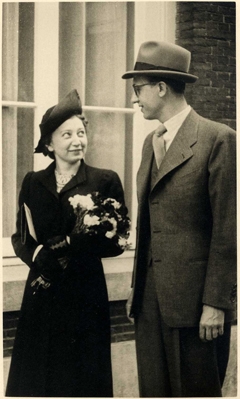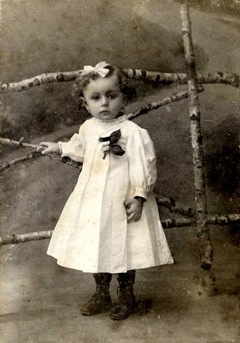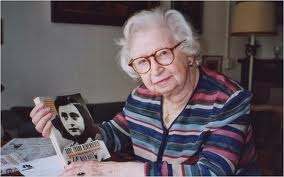Miep Gies was one of the world’s true heroes. Until the summer of 1942 she was just a typical office assistant working in Amsterdam. She had become close with the family of her boss, Otto Frank. In July when he told her that his family had to go into hiding to escape the Nazis, she immediately offered to help, with not even a thought of her own personal safety. When later asked why she decided to help the Franks, she said “I saw no alternative … I was doing my human duty” (Scholastic Interview, 1997). Miep’s selfless acts for the people in hiding during World War II makes her a hero we can all learn from.
 |
| Jan and Miep Gies on their wedding day, 1941 (www.miepgies.nl) |
During the Holocaust of World War II many Jewish people had to go into hiding to avoid being captured and sent to a concentration or forced labor camp. Otto’s oldest daughter Margot received a letter ordering her to a work camp. This is when Otto decided that his family would have to go into hiding. He also agreed to hide a family of three, the Van Pels, and later a dentist, Fritz Pfeffer. Miep wanted to help, feeling it to be her human duty to help others in need. She felt horrible about what the Nazis were doing to Jews, and could not stand to see her friends be sent away to torture. Miep’s biggest contribution to the people in hiding was food. At the time citizens were issued ration stamps, so it was very difficult to come up with enough food to feed eight extra people, especially without raising suspicion. She had to buy food from the black market, and some grocers who sympathized with the plight of the Jews guessed at what she was doing and let her buy extra food. She had to make several trips every day, as bringing in big bags of groceries to the office every day would surely raise suspicion. Other than food, Miep also brought supplies and news from the outside world to the Annex. Miep and her husband Jan managed to keep the people in hiding a secret for over two years. It is not known who betrayed the Franks and others to the police, but Miep says that if she ever found out, she “would not exchange one word with that criminal” (Scholastic Interview, 1997).
 |
| Earliest known photo of Miep, 1912. Photographer (www.miepgies.nl) |
Hermine Santrouschitz was born in Vienna, Austria in 1909. For economic reasons, she was sent to Holland as part of a relief program for malnourished children. There she met her beloved foster parents, who, feeling Hermine was too formal, gave her the name Miep. She moved to Amsterdam with them in 1922. Eleven years later, Miep hears of a job as an office assistant. She takes the job and begins her 44 year long friendship with Otto Frank and his family. In 1941, after being threatened to be sent back to Austria, she married her longtime boyfriend, Jan Gies, becoming a Dutch citizen. Even after the Frank’s capture and after the war ended, she spent the rest of her life living in Amsterdam, traveling around the world to speak to people about her experience and about Anne Frank and her famous diary. On January 11, 2010, just a month short of her 101st birthday, Miep Gies passed away. Thanks to her heroic actions and to Anne’s diary, her legacy will not be forgotten.
Miep Gies is one of my heroes because she is an ordinary person with extremely high morals and extraordinary beliefs and values, who was brave enough and selfless enough to do the right thing in the face of adversity. She knew it would be dangerous, and she knew it would be difficult, but she would not fail to do her human duty. This is important to me because I feel that we need more people in the world like Miep. So many people have lost sight of what is important and only look out for themselves. But Miep was exceptionally trustworthy. She embodied what trustworthiness is all about – loyalty, having the courage to do the right thing, reliability, and integrity. Although she did not consider herself one, her exceptional character made Miep Gies a genuine hero.
 |
| Miep with her own book about hiding the Franks P (http://learning.blogs.nytimes.com/) |
Page created on 7/30/2011 12:00:00 AM
Last edited 7/30/2011 12:00:00 AM
